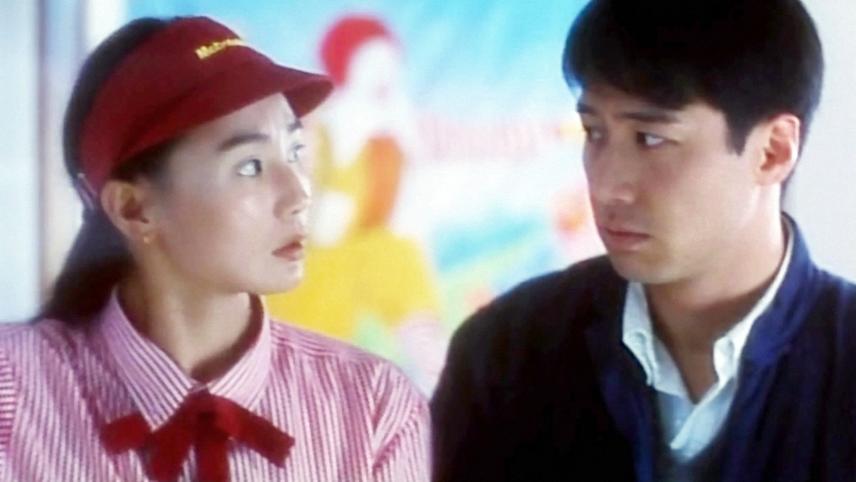
Teresa Teng is one of the most prolific Chinese singers in the modern age. Although artists like Jay Chou and Jolin Tsai may be the leading celebrities of my generation, in my parents’ generation Teresa Teng defined modern Chinese music by fusing elements of Western pop music with Chinese classical overtures — much like what Jay Chou does with his style today. Tian Mi Mi (甜蜜蜜) is among Teresa Teng’s most famous songs, and tells the story of a young woman’s encounter with a man whom she had a dream about (“oh where, where did I see you before? your smile is so familiar — it must have been in a dream”).
This sets the stage for the basis of Comrades, Almost a Love Story, whose Chinese name Tian Mi Mi is taken directly from Teng’s song. The film begins with the two main characters falling alseep next to each other on the Hong Kong metro. Maggie Cheung, in the work that paved the way for her later fame as one of China’s most famous actresses, plays Li Qiao, a Guangzhou native who moved to Hong Kong to find economic opportunity but in reality simply exploits naive new mainlanders who don’t speak Cantonese. She encounters her next victim, the optimistic Li Xiaojun (Leon Lai), who moved to Hong Kong along with his young fiancee to chase economic prosperity as well.
Comrades, Almost a Love Story focuses on the isolation in the crowd and correlative loneliness that many newcomers to a big city often experience. Xiaojun and Li Qiao, despite both being Chinese, find themselves isolated amongst the Hong Kongers. Between humorous scenes of them trying to learn English (with an American teacher having his class chant “die you bastard, die” as they watch a cowboy movie) and their attempts to climb the social ladder as migrant workers, the two eventually fall in some state of love and lust, breaking the oath of fidelity Xiaojun made to his fiancee, brought together by their mutual Chinese-ness in a sea of Hong Kongers who would rather see themselves as British subjects, especially in the face of the repatriation to come a year later.
By and large, Tian Mi Mi uses the eponymous Teresa Teng song as a symbolic representation of the shared experiences of many Chinese, especially as they move abroad from the mainland. The first time Li Qiao and Xiaojun see each other as lovers is while they are selling Teresa Teng records in a hawker stall, only to realize that many Hong Kongers do not listen to Teresa Teng, because “only mainland Chinese listen to her songs.” As the inevitable “move to America” occurs (I suppose this has been a long-standing theme in Chinese culture dating back to the gold rush), Teresa Teng finds its way into the streetside radios in Chinatown in New York, where her songs serve as a rallying point for the homesick Xiaojun and Li Qiao. Teresa Teng’s claim to fame with the Chinese community is thus not only because she was a great singer, but because her songs struck a chord with the cultural milleu of the time — aside from Tian Mi Mi, some of her other famous songs include Stories of a Small Town and The Moon is my Heart that are reminiscent of the songs in dance halls in the opulent 1920s of Shanghai.
In many respects Tian Mi Mi is the most artistic film I’ve reviewed on Cinema Escapist (with my usual Chinese tragi-romances standing in stark contrast to the scholarly reviews that my colleagues often put out) — unfortunately, this means that there are neither a lot of pretty girls in nightclubs nor Mark Chao carrying around Angelababy. However Tian Mi Mi remains a very interesting film from my perspective, and given its numerous accolades that propelled Maggie Cheung to fame, it is definitely worth a watch for any fan of hers or Teresa Teng.
Comrades, Almost a Love Story (Chinese: 甜蜜蜜 “Tian Mi Mi”)—China/Hong Kong. Directed by Peter Chan. First released November 1996. Running time 1hr 58mins. Starring Maggie Cheung and Leon Lai.